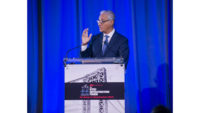Three years’ worth of work in progress on a planned $13-billion airport for Mexico City were put at risk in the wake of the president-elect’s announcement that he would scrap the project after voters rejected it in a four-day referendum late last month.
Incoming President Andrés Manuel López Obrador had organized the informal referendum, which included only about 1.2% of the population voting 70% against the project. Media reports have questioned the integrity of the voting process.
At this point, it’s unclear what the president will ultimately do when he takes office on Dec. 1.
“Our job is to implement the customer’s vision in the best way possible. As that changes, we’ll respond with agility,” says Perfecto Solis, senior vice president of global aviation with Parsons Corp. Parsons was hired in 2014 to provide program management services for the state-appointed agency running the project, in partnership with FOA Consultores and CH2M, in a 6‑year contract.
A joint venture of Foster + Partners, Fernando Romero Enterprise and Netherlands Airport Consultants handled the design of the 743,000-sq-meter terminal. A consortium led by NACO and including Royal HaskoningDHV, Grupo TADCO and Grupo SACMAG is handling landside infrastructure, which includes three runways, all situated on a dry lakebed in Texcoco.
In a formal statement, Parsons says it reported to members of the transition team that the “works percent complete” was 20% as of July of this year, including associated construction management and project management services.
Likewise, more than $8.55 billion in work already under contract has been reported, representing over 60% of the total project investment.”
The president-elect is pushing for construction of two runways at a military airbase with a connection to the current Benito Juarez International Airport south of the city, at a cost of about $3.5 billion.
“We hope to be involved with any alternatives,” says Solis.
Moody’s, in a statement released Oct. 29, said: “The announcement, which followed a nonbinding nationwide vote to which Mr. López Obrador said he would adhere, is credit negative because, depending on how the government implements its decision, the cancellation could trigger the early amortization of $6 billion of senior secured notes.”





Post a comment to this article
Report Abusive Comment